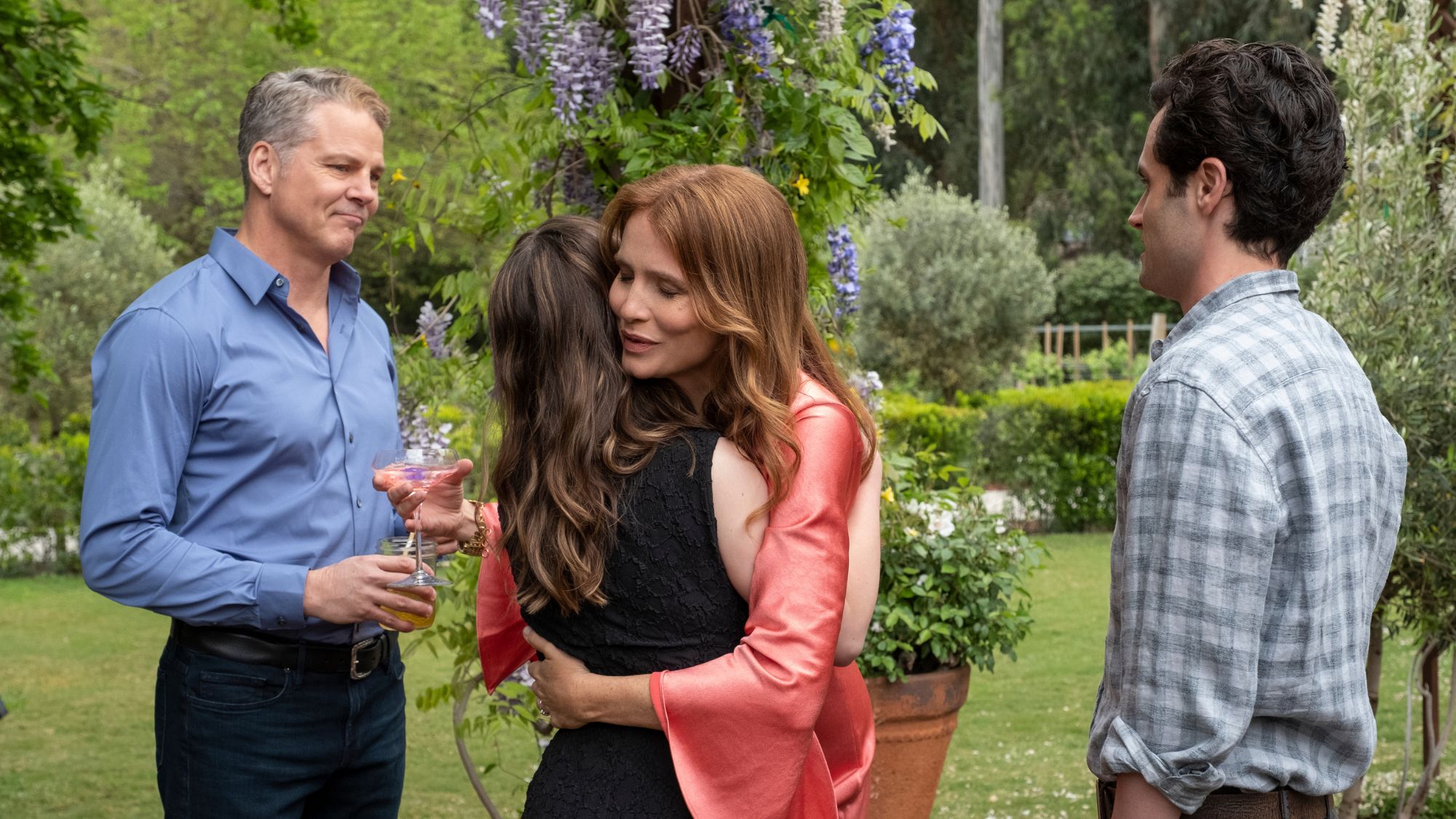What it's really like to spend Christmas with your mother-in-law
Our relationships with our mothers-in-law are still one of the most complex.


As we fast approach the stressful Christmas season and the many subsequent festive family gatherings, two writers share their honest accounts about what it's like to kick it with their partners' (m)other woman during the 'most wonderful time of the year'...
Grace Timothy - "We didn't get off to the best of starts"
"When I first met my mother-in-law, I was 21 – a fashion intern, the fickle one in a stop-start relationship with her son, strident but insecure, a bit mouthy, usually gluten-free. But before he could introduce us, my boyfriend had started vomiting. It turned out my first attempt at baking that morning had nearly killed him. So, in his absence, I had to introduce myself.
She eyed me suspiciously, the lethal cheesecake presumably at the forefront of her mind, and the more I tried to fill the silences that followed, the quicker I realised we were polar opposites. I became acutely aware of my foibles – the lack of life outside of work and the pub, the flashy heels, my too-blonde hair, it all suddenly felt a bit wrong. I was self-conscious, and not like the girl you took home to meet your mum. When my mother-in-law was in her twenties, she’d already had two of her three kids, and was helping out at the local playgroup and ‘young wives’ group, baking, crocheting and gardening. She saw her elderly mother twice a week and looked after everyone without complaint. I barely looked after myself, didn’t visit my family for weeks and couldn’t keep anything alive, except my gut flora.
No matter how hard I tried, we were unable to find common ground. She didn’t drink, I didn’t knit. She didn’t like swearing, I didn’t like Agatha Christie. So, how do you form a relationship, especially when you live 250 miles apart? The answer is: you don’t. I didn’t need another mother figure, and I didn’t have any desire to build a relationship with her. Even when she officially became my mother-in-law five years later, I resisted the ties, choosing to spend Christmas with my own parents. Then I fell pregnant.
Suddenly, it was all about who was buying the crib, which family would host ‘baby’s first Christmas’, and most disturbingly, who would I call when I went into labour, so they could jet down the M1 in time to see the baby crowning.
Things grew worse after I’d given birth. When M-I-L swooped in and took the baby from me when I waddled around the room, I felt irrational jealousy. I hadn’t slept for 72 hours, I didn’t know what I was doing and I wanted to figure it out privately, without feeling judged. I was annoyed that my husband was asking her so many questions about babies, betraying our cluelessness.
When she described how her kids simply slept when they were tired, I felt under attack for my own fastidious routine. When she spoke to the baby, I heard passive-aggressive – ‘Mummy thinks you’re hungry but you’re just bored, aren’t you?’ My husband and his family are from the ‘it never did me any harm’ camp, whereas my family are the founding fathers of the ‘we’re all going to get cancer and die!’ school of thought. So it was inevitable that she would think I was mad when I sanitised the toys she brought down from the loft.
Celebrity news, beauty, fashion advice, and fascinating features, delivered straight to your inbox!
But gradually, things changed. My daughter bonded us, helping me to understand my mother-in-law as a fellow mum. I relaxed into parenthood and stopped taking everything as criticism. She gave good advice and quietly accepted my parenting methods. We bonded over a shared love for my little girl, and she could teach her things I couldn’t – like crafting, knitting and baking without poisoning somebody.
A few years ago, my mother-in-law stayed with us while I was ill. She nursed me, looked after my daughter and when she left, held me tight. ‘Look after yourself,’ she said. ‘Sometimes, you just have to rest.’ Through tears, I told her I loved her, and she said she loved me back. It could have been my rocketing temperature but in that moment, I allowed her to mother me and my child. It felt good for everyone."

Hannah Betts - "My great sadness is not having a mother-in-law"
"I have a therapist friend who, when asked for a word to sum up her female clients’ relationships with their mothers-in-law, opts for ‘complex’. On hearing this, I confess, I snort tea up my nose in mirth. ‘What, complex as in a quick euphemism for total head fuck?’ I enquire. She nods, ‘I believe that is the technical term.’
There’s a reason why mothers-in-law are a joke, and it has nothing to do with pale, male and stale northern comedians. For, whatever the behaviour our mothers inflict upon our partners, it has nothing on the baroque venom that can be directed at women from the mothers of the men we love. I have a colleague whose mother-in-law hit her on a fractious Christmas, blacking her eye. It is a sign of how deeply ghastly the mother/daughter-in-law relationship can be that the rest of the women in our office declared that they would have preferred this to the constant not-so passive aggression.
I’ll never understand the festering jealousy attendant upon some mums’ relationships with their sons – and I don’t want to. Like the men who declare they’ll lock up their daughters when they reach dating age, these individuals aren’t just possessive parents, but bad people.
My first run-in with a heinous mother-in-law proved befuddling. This woman didn’t see herself in parental mode, but more as a rival for her son’s affections. She was bizarrely threatened by teen me and out to impress upon everyone that she was cooler, thinner and more worldly wise (not hard). Accompanying them on their summer holiday aged me ten years: a week of point-scoring that scarred me for life.
The mother of my first love seemed the opposite: warm, welcoming, with the eagerness of a woman without daughters of her own. Yet, over our years together, my lack of biddability meant I could only disappoint. There were ways of doing things that were not my ways, involving God, marriage and offspring. My feminism was inexplicable to her, and I was supposed to prioritise her son’s career over my own, despite mine being more successful at the time. Being ‘one of the family’ increasingly translated as cloying claustrophobia. The next was brittle, defensive, damning; forever pointing out that I was a ‘funny little thing’, despite me being an adult with a job.
It took me until my thirties to love a mother-in-law. The saintly Nan invited me into her family with generosity and lack of judgment. She accepted me for who I am, looking on our differences as points of interest rather than battles. During a decade in which my own mother cut me off, she supported me without ever trying to replace her. After my relationship with her son was over, we wrote to each other with gratitude. I wept at her husband’s funeral, bringing ping pong and fancy cakes. And she wrote to me when my own mother died, the only such missive I could bring myself to read.
Today, in my forties, my great sadness is not having a mother-in-law. My partner’s mother died when she was 20. I dearly wish I’d met her, not least as my relationship with my own mother proved so difficult. Instead, I take enormous pleasure in using some of her things: a pair of diamante earrings, a silver jewellery box inscribed with her initials, a set of impeccable teaspoons.
I glimpse her fleetingly in the way her son is with me: boyish, besotted, bunting me with his head for affection. A single-sex boarder from the ages of eight to 18, women hold a charm and a fascination with him. Without sounding too Freudian, I realise I can be not merely a lover, but mother to that boyish part. She may not be here, but that doesn’t mean I cannot learn from her."
Niamh McCollum is Features Assistant at Marie Claire UK, and specialises in entertainment, female empowerment, mental health, social development and careers. Tackling both news and features, she's covered everything from the rise of feminist audio porn platforms to the latest campaigns protecting human rights.
Niamh has also contributed to our Women Who Win series by interviewing ridiculously inspiring females, including forensic scientist Ruth Morgan, Labour MP Stella Creasy and ITV’s former Home Affairs Editor Jennifer Nadel.
Niamh studied Law in Trinity College Dublin. It was after enrolling in a Law & Literature class on her year abroad in Toronto that her love of writing was reignited. In no particular order, her big likes are Caleb Followill, hoops, red wine, sea swimming, shakshuka and long train journeys.
